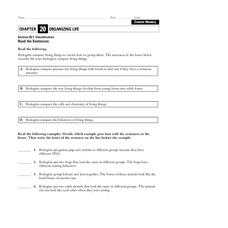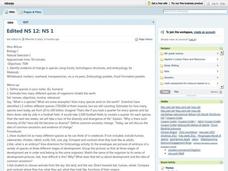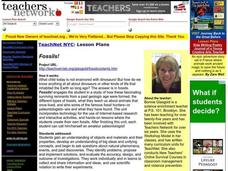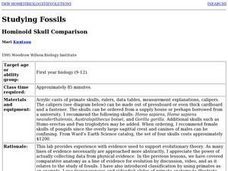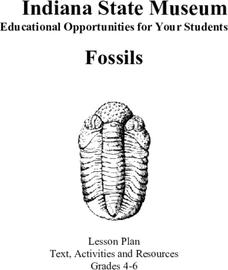Curated OER
Examining the Fossil Record
Students create an evolutionary tree based on fossil morphology and their ages. In this fossil record lesson plan, students are given 23 pictures of fossil. They study their morphology and arrange the fossils by age and structures on a...
Curated OER
Bellwork for Week 8-Continental Drift and Fossils
In this continental drift and fossils activity, students complete a puzzle of the continents and they answer questions about fossils, the layers of the earth's crust, Wegener's continental drift theory and the major plates.
Curated OER
What is a Fossil?
In this fossils worksheet, students are given a bag of fossils mixed with non- fossils. They are to determine which category each item belongs to and give a reason. They answer questions about how they determine fossils from non-fossils.
Curated OER
Activity Three: The Mystery Fossil Bones Activity
In this fossil worksheet, students are given a page of bones to cut out and assemble. They create an animal with the bones and add external features to their animal. They answer questions and present their creature to the class.
Curated OER
Fossil Lab
In this fossil activity, students are given fossils and an identification key. They write their scientific names and common names. They also answer questions about fossils.
Curated OER
Activity Two: The Classic Fossil Lab-Simple Format
In this fossil worksheet, students are given a bag of fossils to identify. They use a key and a worksheet with pictures of the various types of fossils. They answer questions about fossils and use a web site to find out if their state...
Curated OER
Geologic History PowerPoint Follow Sheet-The Rules of the Game
In this geologic history worksheet, learners answer questions about the earth's history, about dating fossils, about layers of rocks and about unconformity.
Curated OER
Fossils Footprints Across Time
Students examine fossils to understand how they are formed and how they give information about geological history. In this fossil activity, students research and write about fossils and make models of different fossil types.The PDF...
Curated OER
Where In the World?
In this where in the world activity, students determine locations of continents on a world map. In this cut and paste activity, students identify continents' locations on a world map.
Curated OER
Evidence for Evolution
In this evidence of evolution worksheet, students review notes given by referring to the Nelson Biology text, chapter 11/13. Students read the notes and the specified pages in the text.
Curated OER
Classification
In this classification worksheet, students use information describing the ways biologists compare living things to complete 4 matching questions.
Curated OER
Monument or Energy?
In this national monument worksheet, students will read about the national monument in Utah and the pros and cons about it being a protected area. Students will complete 6 short answer questions based on what they read.
Curated OER
Natural Selection
Students estimate how many different species of organisms inhabit the Earth. In groups, they match the pictures of embryos at the different stages of development. They compare and contrast animals from the sky, land, and water and...
Curated OER
Fossils!
Students conduct Internet research about different types of fossils, the animals they are from, and some famous paleontologists. They also participate in some interactive activities and hands-on lessons in which they create their own...
Curated OER
Fossils and our Past (part 1 of 3)
Third graders investigate how some extinct organisms resemble organisms that are still alive today. They watch and discuss the Magic School Bus video about fossils, then create clay fossil imprints, matching the imprints to plaster of...
Curated OER
The Use of Myths in Science
Students are told stories, myths and legend to explain their world. After telling the tales and discussion them, students are assigned to write a myth that describes a familiar situation, such as why the school garbage cans are always...
Curated OER
Studying Fossils
Students compare and contrast key skeletal differences between chimpanzees and humans: brain size, teeth, hand and thumb, trunk, pelvis, lower limb, foot and big toe. They then sort and group a set of mixed "fossil bones" of chimpanzee...
Curated OER
Dinosaur Tracks: From Stride To Leg Length To Speed
Students determine the relationship between leg length, stride length, and speed in humans and bipedal dinosaurs. They collect data and graph these human characteristics then use actual data collected from dinosaur track pads and fossils...
Curated OER
Rockin? Chalk (Integrating science - make own chalk)
Students use plaster of Paris, talc, and cornstarch to create their own chalk. They hypothesize what mixture of ingredients produce the "best" chalk. Students discuss what they think are the characteristics of the "best" chalk.
Curated OER
Studying Fossils: Hominoid Skull Comparison
Students collect data on the differences in Hominid skulls using acrylic casts of fossil skulls. They measure a series of structures on skulls from six different species then use the data to determine evolutionary relationships between...
Curated OER
Fabulous Fossils
Students investigate how fossils are formed. They read the book, "Digging Up Dinosaurs," examine fossil samples, create a fossil imprint using play-doh, and complete a Fossil Questionnaire activity sheet.
Curated OER
How Did Humans Evolve?
Students complete an online activity in which they examine fossils to find possible hominid family trees.
Curated OER
Fossils
Students complete a unit on fossils. They read and discuss informational handouts, define key vocabulary terms, answer discussion questions, create a geologic timeline and a timeline of their own life, analyze bones, and create a fossil...
Curated OER
Dinosaurs are for the Birds
Students use the Internet to see photographs of fossils from dinosaurs. They read articles about dinosaurs and birds and what they had in common. They also examine a dinorama site in which they discover why some dinosaurs needed feathers.












